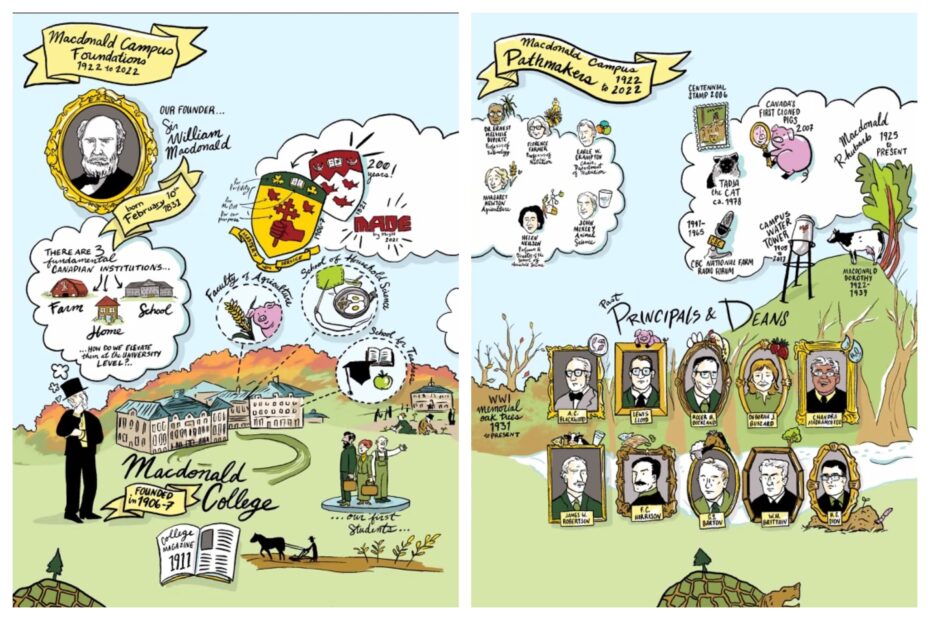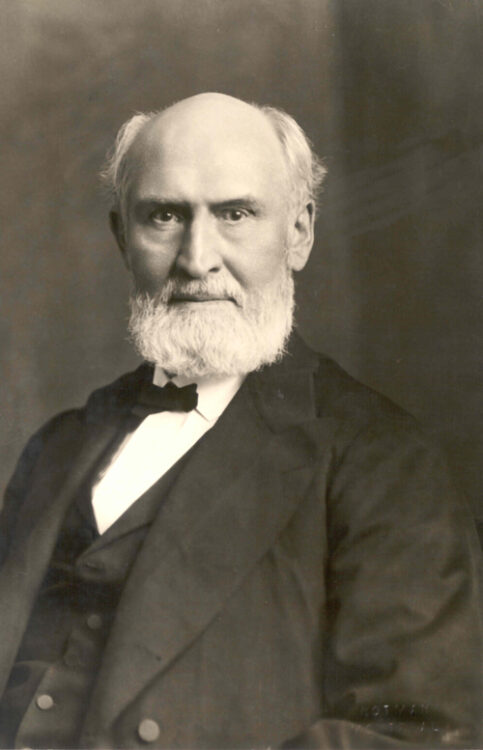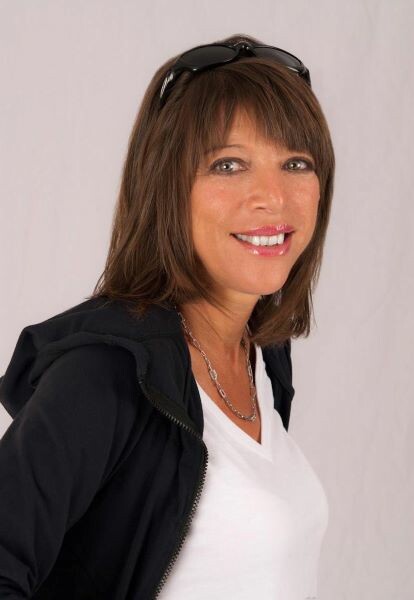
Each February, the Macdonald campus community gathers to mark Founder’s Day, a birthday celebration for Sir William C. Macdonald (1831–1917), who founded Macdonald College in 1907. The celebration is always held on the Thursday closest to the anniversary of Sir William’s birth, February 10; this year’s Founder’s Day happened to fall right on the actual day.
Last year’s MC, Professor Murray Humphries, McGill Northern Research Chair, returned to the virtual podium as 2022 host. He noted that Founder’s Day “is not necessarily a celebration of a single man, but rather of his vision for what was possible and the catalyst for everything that’s followed. It’s about growth and learning and vision that changes and evolves over time.”
“This year, we’ve reached out to our campus community and received valuable feedback about the future and who we are and where we’re going, and who’s included and impacted by the work we do at this campus,” continued Humphries. “So our hope is that this isn’t a one-day event, but rather the beginning of an ongoing dialogue amongst community members about how we continuously improve who we are and what we do.”
Shared responsibility
Humphries noted that the Mac campus is on Haudenosaunee territory, so it was appropriate that the ceremony proper began with words from across the river in Kahnawá:ke. Kanien’kéha elder Amelia McGregor offered the Ohénton Karihwatéhkwen (“the words that come before all else”), a reminder of everyone’s shared responsibility to the ecosystem and the sustaining spirit of creation.
McGregor was joined by Mac professor Treena Wasonti:io Delormier, Associate Director of the Center for Indigenous Peoples’ Nutrition and Environment and the Canada Research Chair (Tier II) in Indigenous Peoples’ Nutrition and Food Sovereignty. The two women have collaborated on in-community research projects since 1994, including the Kahnawá:ke Schools Diabetes Prevention Program, which Wasonti:io Delormier said “has served as a model for how to do partnership research with Indigenous communities. A lot of how we operate is rooted in Haudenosaunee values, principles and lessons to figure out how best to make decisions and partnerships. And how do we continue to learn from those. We’re still learning. We just recently had a discussion about how do we integrate ceremony, meaningfully and respectfully, into research.”
Multiple milestones

In addition to marking Sir William Macdonald’s 192nd birthday, this year also marked the last Founder’s Day for Bruce D. Bolton (BSc’72) in his official, longstanding capacity as executive director of the Macdonald Stewart Foundation. The Foundation continues the philanthropic tradition of Sir William Macdonald and his heirs, the Stewart family.
“It’s a sincere thanks from the Macdonald campus community to Bruce Bolton and the Macdonald Stewart Foundation for all the support that they’ve shown to our campus over the years,” said Humphries. He also took a moment to welcome the Foundation’s new associate executive director, Thomas Leslie (LMus’06).
Although Bolton joined the virtual celebrations from Florida, he was a fixture at in-person Founder’s Days, always decked out in tartan and brandishing his trusty bagpipes.
“The times that we have shared on Founder’s Day will be among the most memorable of my career simply because I have had the privilege to be piped into the room by Bruce Bolton,” recalled Anja Geitmann, Dean of the Faculty of Agricultural and Environmental Sciences. “Thank you to Bruce, for not only the many years of service for the Foundation, but for the many things that you have done for this campus and for creating this particularly special memory.”
Drawing the future
As part of McGill’s Bicentennial year, the 2022 Founder’s Day took on a graphic twist—literally.
In the week’s leading up to the big day, McGill students, faculty and staff were asked to share their feelings about the campus. What’s their favourite thing about Mac? How would they describe Mac in one word? In one colour? One emotion? How do they hope to see the Macdonald campus, and the work being done there, evolve over the next 50 years and beyond?
Illustrator Jordana Globerman (BA’11) synthesized those ideas into seven dynamic, vibrant panels that tell the story of Mac’s past, present and visions for the future. Globerman unveiled her artwork—including the four future-focused panels that she drew in an interactive real-time Zoom performance on Thursday morning—at the event.
“I was blown away by the input,” said Globerman, an Ottawa-based visual storyteller. “There were so many great ideas, and so much engagement throughout the morning. It’s really nice to see that there’s quite a close-knit community at Macdonald.”
The panels are still a work in progress. Plans are underway to permanently display Globerman’s final artwork on campus, possibly in the hallway connecting the Macdonald Stewart and Raymond Buildings.
A vision for hands-on learning
“How do we get from a single person to an entire campus with thousands of students?” asked Geitmann. “Our founder’s vision is bigger than the founder.”
Dean Geitmann outlined the broad strokes of Macdonald’s biography. Wealthy industrialist. Generous benefactor. Fourth chancellor of McGill. Big champion of the University’s law, engineering, physics and architecture departments in the 1890s and early 1900s. Helped set up McGill’s first student recreation facility, in the building that is now home to the McCord Museum.
“All of this was, of course, on the downtown campus,” Geitmann noted. “How did we get from this passion for education to a campus at Sainte-Anne-de-Bellevue? Such a vision doesn’t just get created overnight, right? You don’t go to sleep and wake up the next morning with the idea to set up a huge campus.”
The catalyst was cheese. Specifically, James Wilson Robertson, a cheese manufacturer, educator and civil servant.
“Robertson was fascinated by the fact that the quality of food dependent on several factors,” explained Geitmann, “and these included but not only the cheese maker, but the quality of the milk. And the quality of milk, of course, depends on the health of the cow. And the health of the cow depends on the quality of the fodder. And the fodder, of course, depends on the richness of the soil. So he very much saw that interlinkage between the soil, the animal health, and the eventual outcome.”
Better crops through science
Sir Macdonald met Robertson around 1897, “probably on an experimental farm in Ottawa.” The two shared an interest in educational reform, especially in rural areas. To spur children’s interest in agriculture, Robertson and Macdonald partnered in an annual agricultural competition to reward children who grew the highest-quality seed grain.
“After several years, the final seeds were actually 20 per cent bigger than the initial seeds,” said Geitmann. “So through this competition, they illustrated the cuts of crops could be bred through systematic selection. And they didn’t only do that in a research, scientific way, but they did it through the involvement of the general public, and more importantly, through children. So it was very inspired.”
Buoyed by this success, and taking further inspiration from schools in Britain and Sweden, Macdonald and Robertson established a program of manual training workshops for boys and girls, and consolidated small schoolhouses into larger schools with multiple teachers teaching several disciplines. Macdonald purchased several farms on the western tip of Montreal to create a contiguous plot of land to house one such large school: Macdonald College, which taught agriculture, household sciences, and teaching.
(For a full history of the Mac campus, see its Bicentennial timeline.)
“What was really important at the time was the dedication to hands-on learning,” noted Geitmann, “and that’s a dedication we have today as well: to make learning an experience that goes beyond the classroom. And that gives students the experience that they need in order to get a real job later on. So that vision that was started more than 100 years ago is ongoing. We’re continuously building the campus, we’re continuously building the programs, and that is something that is truly integral to an educational institution, and in particular, to Macdonald campus.”
Nancy Lavigne: A force of nature
For many years, Paul Meldrum, the Macdonald Campus Farm Manager, brought his affable wit (and, yes, kilt) to his duties as Founder’s Day master of ceremonies. With his retirement just a few short months away, Meldrum returned to the Founder’s Day podium to present the Macdonald Campus Award of Excellence for Administrative and Support Staff to a cherished colleague: Nancy Lavigne.

For the past 24 years, Lavigne has worked diligently and tirelessly as Administrator of the Macdonald Campus Farm. (As Meldrum noted, this was prefaced with almost 14 years in other capacities at McGill, including six years with Printing Services and another six years “in charge of conferences and special events and alcoholic beverage control.”) The experimental and demonstration farm spans 205 hectares, so keeping such a large endeavour running requires Lavigne to coordinate among a wide variety of players and departments: professors, researchers, students, facilities tradespeople, University administration, farm staff, and a seasonal army of 50 student casual workers.
Lavigne also facilities the many requests for public tours, and was instrumental in developing the tour curriculum, hiring and training tour guides, and promoting and booking tours—a busy role that will only get busier with the opening of the forthcoming Macdonald Farm Community Engagement Centre.
“Nancy is the first person that you meet when you ask for anything of the farm,” said Meldrum. “There are many requests of the farm, and Nancy answers all those requests, not just as part of her duty, but with a smile and with exuberance.”
“When Nancy throws herself into a job, it is full bore,” he continued. “When we did open houses with the UPA [Union des producteurs agricoles] and with the town of Sainte-Anne, she was in there like a dirty shirt. When we took on more departments at the farm, the Lods [Agronomy Research Centre] and the Horticulture Centre, she helped make that transition easy. When we reimplemented the educational tours, it was Nancy who canvassed all the schools and the school boards in the greater Montreal area, developed a pamphlet, had the photography done, went to a printer, mailed out all those pamphlets, year after year—and she coerced the Milk Producers Federation into giving free chocolate milk!
“There’s no halfway with Nancy. It’s go big or go home.”
Gold Key recipients
Next, it was time to honour six Mac students with Gold Key Awards. The Award is given out by the Macdonald Branch of the McGill Alumni Association to students in recognition of leadership and excellence in the promotion and development of extracurricular activities. Laura Wittebol, one of two Gold Key Committee Co-Chairs, presented the 2022 awards.
This year’s Gold Key recipients are:
- Antoine Bouvier (Bioresource Engineering, U3): Eager to share his passion for 3D printing with the Macdonald community, Bouvier revived and expanded the Mac 3D Printing Club to become a viable and forward-looking venture, showing an entrepreneurial spirit which now benefits many students and clubs at Macdonald campus.
- Sean Clarke (Bioresource Engineering, U3): Resourceful and creative in his roles as VP Finance in the Bioresource Engineering Students’ Society and the Macdonald Campus Student Society, Clarke has found ways to increase funding for student projects and clubs, while also improving accessibility and equity in its allocation, to the benefit of all Macdonald students.
- Chloe Garzon (Human Nutrition, U3): A compassionate and considerate leader, Garzon is the proud president of both the Macdonald Bring Your Own Bulk group and the Macdonald Campus Student Society. These opportunities allow her to engage with students, clubs, and societies on our campus and help them to flourish. She also enjoys her work as Tomlinson Engagement Award Member (TEAM) in Organic Chemistry, where she helps students by using innovative learning methods.
- Anthony Iheonye (PhD candidate, Bioresource Engineering): Winner of the Macdonald Campus 3MT Competition in 2019, Iheonye has continued to work with the Lister Family Foundation and Teaching and Learning Services to help students with their communication skills. As an International Student Buddy, he advises new students and helps them integrate at Mac. For MCGSS, he has worked to help engage all graduate students by organizing events including Graduate Orientation and other social activities.
- Krisztina Mosdossy (PhD candidate, Natural Resource Sciences): Visionary and inspiring, Mosdossy works to engage her fellow students at Macdonald campus with their environment, relating to agriculture, social equity, and sustainability. She does this through her active involvement in the Macdonald Permaculture Showcase Garden, the Women+ in Science group, and the Sustainability of Operations at Macdonald Campus Task Force.
- Sharvani Ram (Food Science and Agricultural Chemistry, U3): A cognizant community leader, Ram has been involved in many campus-wide groups and initiatives, where her passion in fostering a sense of community and student engagement at Macdonald Campus is strongly evident. She is especially proud of her work as President of the Dietetics Human Nutrition Undergraduate Society, where she has worked to develop a peer-led mentorship program and panel discussions to raise awareness about competencies and cultural humility.

It is with great pleasure that I observe how the next generation is leading Mac into the future. I am proud to have been a graduate. Keep up the good work.